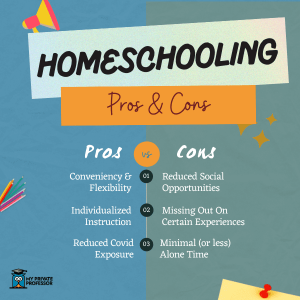Homeschooling is no new concept, but with mounting concerns around Covid-19, it may be more on parents’ radars than ever.
In the past, people have believed that homeschooled kids don’t receive proper education. But as life changes, so do we.
In fact, research shows just that. According to Admissionsly, until 2019, the number of homeschooled students was growing by 2% to 8% annually. Then, from 2019 to the fall of 2020, the number increased to 9%.
Homeschooling is, objectively, a different experience than traditional school. But while some people can’t imagine teaching their children and being with them for the entire week, others welcome the opportunity.
Homeschooling pro: Scheduling conveniency & flexibility
With traditional schooling, there’s typically a rigid schedule. If students have commitments within this schedule, they face challenges. They may miss auditions, interviews, or practices. Or, they may fall behind in school. It can be difficult to balance so much when school takes up most of the weekday.
Homeschooling allows for you and your kids to craft your own, unique schedules. And this can benefit all of you. Maybe you’re finally able to hit the grocery store in the AM, when the other parents are dropping kids off at school!
Homeschooling con: Lack of socialization
Since homeschooling usually only includes your children, they may miss out on some socialization that comes with traditional school.
Group play time, recess, and lunch hours are all important parts of school, since students learn about making friends, developing empathy, and general social skills. These are opportunities that homeschooling doesn’t necessarily offer.
This isn’t to say that homeschooling won’t involve socialization—but it certainly is different, and will be more difficult to create the same opportunities (if that’s what your kid desires/needs). That being said, it’s then up to you as the parent—and now teacher—to provide socialization opportunities.
A great first step is to find some contacts who are also homeschooling their children and make plans to get together.
Homeschooling pro: Individualized instruction
One major benefit to homeschooling is that since the “class” is so little, it can be tailored to each student’s skills, weaknesses, and interests.
Does your child need extra help crafting a persuasive essay? Are they particularly interested in mastering a foreign language? With homeschooling, you have the freedom to individualize lessons to these particularities. You can spend extended times on subjects where your children need extra help, and fast-forward through topics about which they feel confident.
Homeschooling con: Missing out on experiences
The reality is that schools plan field trips & several in-school events—and even if you plan the same trips with your kids, it’s not really the same. The socialization and group dynamic aspects here are major, since adolescents are largely developing both socially and emotionally during this time.
In addition to the trips they might miss out on, there are many other events that students in traditional schools enjoy. For instance: the school play, field days, pep rally, team sports, etc.
Homeschooling pro: Less covid exposure
At this time, many families are still very diligently monitoring their health and are concerned about the pandemic. And rightly so, since many of us haven’t lived in a time like this ever before.
Keeping the kids at home definitely reduces the risk of exposure to Covid. If your family is anxious about this, homeschooling the kids will likely make everyone feel more at ease.
Homeschooling con: Less time for yourself (parents)
For the parents, one unsurprising downside to homeschooling is that you’ll have less time for yourself. You certainly won’t have the same amount of free time that you did prior to starting homeschooling. You’ll probably have to work harder to get that solitude time where you can do the things you want to do by yourself.
Homeschooling pro: Building your relationships
Inevitably, when you and your kids go down the homeschooling road, you’re bound to get closer. This may be challenging at first, since you’re probably not used to spending that much time together. But it can also be very rewarding, especially if you and your children aren’t particularly close initially.
You may learn much more about your children and appreciate the opportunity to build your relationship.
What do statistics say?
When looking at empirical studies and research on the effectiveness of homeschooling in comparison to traditional school, results are mixed. Some studies say homeschooled students have higher academic performances than others, while some studies say the students perform equally well.
According to Online College.org, there is research that indicates homeschooled students having higher GPAs than traditional students. The reason for this may partially be that homeschooled students receive individualized instruction and ultimately get more teacher attention.
Additionally, a 2014 study based on pairs of students—one homeschooled, one traditionally schooled—used a Social Skills Rating System to evaluate the students. The researchers found that homeschooled students achieved higher scores on this scale than traditionally-schooled students.
The reasons for this are inexplicit, but the researchers noted that possible factors for homeschooled students scoring higher include church attendance and the lower teacher-child ratio.
It’s also important to note that research does indicate that homeschooled students are, despite common beliefs, well-socialized. A 2008 paper, Evidence for Homeschooling: Constitutional Analysis in Light of Social Science Research, found that homeschooled students are just as or even better prepared, socially, to become part of society compared to students in traditional school.
Finally, according to the National Home Education Research Institute, homeschooled students usually score above average on the ACT and SAT. This could very well be in part due to how homeschooling allows for parents to have full freedom in the curriculum.
And the winner?
Evidently, we can’t say there’s a clear-cut winner based on the pros and cons. Whether you prefer traditional school or homeschool depends on your unique family situation, needs, and preferences.
It’s also important to note that not all families can afford the privilege of homeschooling. Many households have two full-time working parents, so it may not be possible for someone to stay at home with the kids.
So, essentially, empirical evidence falsifies the belief that homeschooling is ineffective. And the studies that show homeschooling students performing better than traditionally-schooled students isn’t really enough to say that homeschooling is superior. It might just mean that for some students, homeschooling works much better than traditional school.
Author: Lydia Schapiro








